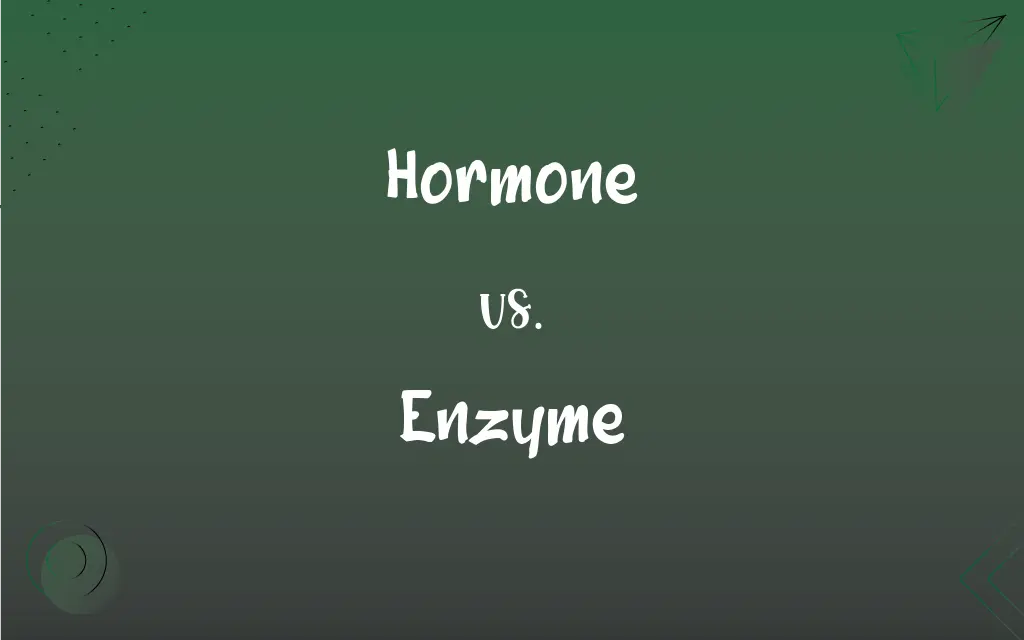Hormone vs. Enzyme: What's the Difference?
Edited by Aimie Carlson || By Harlon Moss || Updated on October 28, 2023
Hormones are chemical messengers regulating body processes, while enzymes are proteins that catalyze biochemical reactions.

Key Differences
Hormones play a pivotal role in regulating various physiological processes within an organism, acting as chemical messengers that travel in the bloodstream. Enzymes, on the other hand, are specialized proteins that accelerate biochemical reactions, ensuring metabolic processes occur efficiently.
The primary function of hormones is to transmit signals and regulate activities such as growth, metabolism, and mood. These molecules are produced by endocrine glands and affect target organs or tissues. Enzymes, in contrast, facilitate reactions, breaking down substrates or combining molecules, without being consumed or altered in the process.
Hormones are synthesized and secreted by specific glands in the endocrine system, such as the thyroid, pancreas, or adrenal glands. Enzymes, however, are produced by almost all cells, with some even being secreted, like digestive enzymes released into the gastrointestinal tract.
Hormones can be proteins, steroids, or amines, and their action can be either short-lived or prolonged, based on their nature and the body's needs. Enzymes, being proteins, have a specific three-dimensional shape crucial for their function. Changes in pH or temperature can denature them, rendering them inactive.
The release and action of hormones are meticulously regulated through feedback mechanisms to maintain homeostasis. For instance, the amount of a hormone can influence its own release or that of another hormone. Enzymes, however, are regulated by factors like pH, temperature, and the presence of specific molecules that can enhance or inhibit their activity.
ADVERTISEMENT
Comparison Chart
Function
Regulate physiological processes
Catalyze biochemical reactions
Nature
Can be proteins, steroids, or amines
Proteins
Production Site
Endocrine glands
Almost all cells
Action Duration
Can be short-lived or prolonged
Acts transiently on substrates
Regulation
Through feedback mechanisms
By pH, temperature, and specific molecules
ADVERTISEMENT
Hormone and Enzyme Definitions
Hormone
A molecule responsible for transmitting signals within the body.
The hormone cortisol increases in response to stress.
Enzyme
A biological catalyst facilitating specific reactions.
Without the enzyme ribonuclease, RNA degradation would be much slower.
Hormone
A substance that controls and regulates activities in the body.
Thyroxine is a hormone essential for metabolism and growth.
Enzyme
A protein that catalyzes biochemical reactions.
Lactase is an enzyme that breaks down lactose.
Hormone
A compound influencing the function of distant organs.
The hormone adrenaline prepares the body for fight or flight responses.
Enzyme
A substance ensuring efficient conversion of substrates.
DNA polymerase is an enzyme vital for DNA replication.
Hormone
A regulator of specific physiological processes.
The hormone estrogen plays a crucial role in female reproductive functions.
Enzyme
A molecule accelerating metabolic processes.
The enzyme amylase aids in the digestion of carbohydrates.
Hormone
A chemical messenger produced by endocrine glands.
Insulin is a hormone that regulates blood sugar levels.
Enzyme
A protein with a specific function based on its shape.
The enzyme lipase specifically targets and breaks down lipids.
Hormone
A substance, usually a peptide or steroid, produced by one tissue and conveyed by the bloodstream to another to effect physiological activity, such as growth or metabolism.
Enzyme
Any of numerous compounds that are produced by living organisms and function as biochemical catalysts. Some enzymes are simple proteins, and others consist of a protein linked to one or more nonprotein groups.
FAQs
Are all hormones proteins?
No, hormones can be proteins, steroids, or amines.
Can enzymes be reused in reactions?
Yes, enzymes can catalyze reactions multiple times without being consumed.
What's the primary role of hormones in the body?
Hormones act as chemical messengers to regulate various physiological processes.
Can external factors influence hormone production?
Yes, factors like stress, diet, and sleep can influence hormone production.
How do enzymes aid in digestion?
Enzymes break down food molecules into simpler forms for absorption.
What can denature enzymes and halt their function?
Extreme pH levels and temperatures can denature enzymes.
How do hormones affect mood?
Hormones like serotonin and dopamine play roles in mood regulation.
What determines the specificity of an enzyme's action?
The specific shape and structure of the enzyme determine its specificity.
Are enzymes only found in the digestive system?
No, enzymes are present throughout the body and involved in numerous metabolic reactions.
Are enzymes always proteins?
While most enzymes are proteins, some RNA molecules can also have enzymatic activity.
Which gland produces the growth hormone?
The pituitary gland produces the growth hormone.
What role do enzymes play in DNA replication?
Enzymes like DNA polymerase facilitate the copying of DNA strands during replication.
Are hormone imbalances common?
Hormone imbalances can occur and may lead to various health issues.
Can enzymes act outside the body?
Yes, enzymes like those in laundry detergents can act outside the body.
What's the significance of enzyme specificity?
Enzyme specificity ensures that only specific substrates are acted upon, maintaining order in metabolic pathways.
How are hormone levels regulated in the body?
Hormone levels are often regulated through feedback mechanisms.
Can hormone levels fluctuate during the day?
Yes, some hormones, like cortisol, have daily patterns of secretion.
What is a primary source of hormones in females?
The ovaries are a primary source of female hormones like estrogen and progesterone.
Can enzyme activity be inhibited?
Yes, enzyme activity can be inhibited by certain molecules or conditions.
How do hormones reach their target organs?
Hormones travel through the bloodstream to reach their target organs.
About Author
Written by
Harlon MossHarlon is a seasoned quality moderator and accomplished content writer for Difference Wiki. An alumnus of the prestigious University of California, he earned his degree in Computer Science. Leveraging his academic background, Harlon brings a meticulous and informed perspective to his work, ensuring content accuracy and excellence.
Edited by
Aimie CarlsonAimie Carlson, holding a master's degree in English literature, is a fervent English language enthusiast. She lends her writing talents to Difference Wiki, a prominent website that specializes in comparisons, offering readers insightful analyses that both captivate and inform.
































































